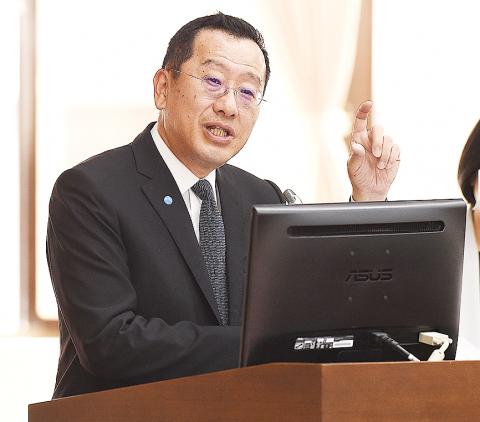The Financial Supervisory Commission (FSC) yesterday said that it has told six local banks to quickly return a total of NT$6.98 million (US$231,932) to their credit card clients for interest rate overcharges on revolving credit.
“It seems that the six banks have a problematic calculating system, and we have requested them to improve their systems,” Koo said during a question-and-answer session at a meeting of the Legislative Yuan’s Finance Committee in Taipei.
He did not name the banks, although Democratic Progressive Party (DPP) Legislator Michelle Lin (林楚茵) urged him to do so, telling lawmakers only that several were privately owned banks.

Photo: Chen Chih-chu, Taipei Times
DPP Legislator Chuang Jui-hsiung (莊瑞雄) said the banks should be penalized by the commission for taking advantage of their clients.
Koo’s comments came after a report from the commission’s Inspection Bureau on Monday said that routine inspections last year found that some banks have been overcharging customers by rounding up their interest rate fees to the nearest integer, instead of rounding them off as stipulated in their credit-card contracts.
Banks are also required to calculate the interest based on each cardholders’ payment deadline, instead of the account closing date, but some have failed to do so and overcharged, the report said.
The six banks would be asked to assign a non-credit card division — such as compliance or information technology division — to set up a new mechanism to confirm that their credit card divisions are doing the calculation correctly, a commission official told the Taipei Times by telephone.
However, cardholders should also pay attention to their bills and calculate the interests themselves to see if they are being charged the correct amount, the official said.
“We still encourage consumers to use credit cards as a payment tool instead of a way to take out a loan, to avoid a heavy financial burden,” the official added.

Sweeping policy changes under US Secretary of Health and Human Services Robert F. Kennedy Jr are having a chilling effect on vaccine makers as anti-vaccine rhetoric has turned into concrete changes in inoculation schedules and recommendations, investors and executives said. The administration of US President Donald Trump has in the past year upended vaccine recommendations, with the country last month ending its longstanding guidance that all children receive inoculations against flu, hepatitis A and other diseases. The unprecedented changes have led to diminished vaccine usage, hurt the investment case for some biotechs, and created a drag that would likely dent revenues and

Global semiconductor stocks advanced yesterday, as comments by Nvidia Corp chief executive officer Jensen Huang (黃仁勳) at Davos, Switzerland, helped reinforce investor enthusiasm for artificial intelligence (AI). Samsung Electronics Co gained as much as 5 percent to an all-time high, helping drive South Korea’s benchmark KOSPI above 5,000 for the first time. That came after the Philadelphia Semiconductor Index rose more than 3 percent to a fresh record on Wednesday, with a boost from Nvidia. The gains came amid broad risk-on trade after US President Donald Trump withdrew his threat of tariffs on some European nations over backing for Greenland. Huang further

CULPRITS: Factors that affected the slip included falling global crude oil prices, wait-and-see consumer attitudes due to US tariffs and a different Lunar New Year holiday schedule Taiwan’s retail sales ended a nine-year growth streak last year, slipping 0.2 percent from a year earlier as uncertainty over US tariff policies affected demand for durable goods, data released on Friday by the Ministry of Economic Affairs showed. Last year’s retail sales totaled NT$4.84 trillion (US$153.27 billion), down about NT$9.5 billion, or 0.2 percent, from 2024. Despite the decline, the figure was still the second-highest annual sales total on record. Ministry statistics department deputy head Chen Yu-fang (陳玉芳) said sales of cars, motorcycles and related products, which accounted for 17.4 percent of total retail rales last year, fell NT$68.1 billion, or

MediaTek Inc (聯發科) shares yesterday notched their best two-day rally on record, as investors flock to the Taiwanese chip designer on excitement over its tie-up with Google. The Taipei-listed stock jumped 8.59 percent, capping a two-session surge of 19 percent and closing at a fresh all-time high of NT$1,770. That extended a two-month rally on growing awareness of MediaTek’s work on Google’s tensor processing units (TPUs), which are chips used in artificial intelligence (AI) applications. It also highlights how fund managers faced with single-stock limits on their holding of market titan Taiwan Semiconductor Manufacturing Co (TSMC, 台積電) are diversifying into other AI-related firms.